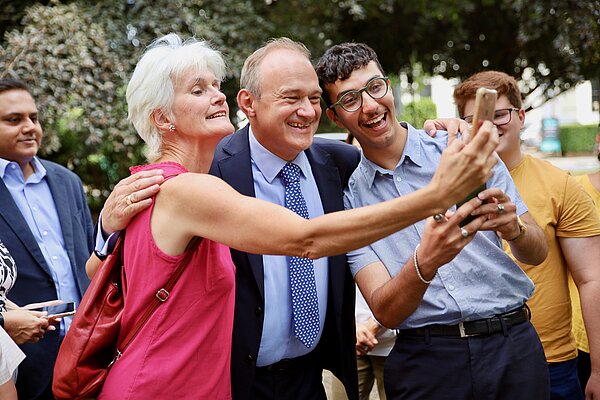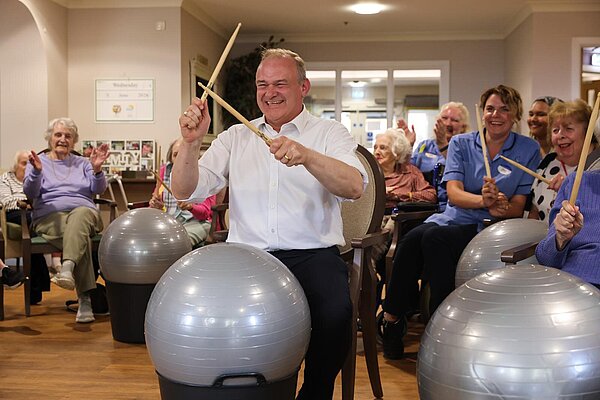The Power of Creativity
The Liberal Democrat plan for culture and creative industries

Liberal Democrats have always championed the cultural and creative industries as vital for our economic growth. But they are not just about wealth creation, they are also about enriching our everyday lives.
Music, dance, film, theatre, art are at the heart of everything that brings us together as families, communities and friends. Whether pop music or classical concerts, the latest blockbuster movie or art-house film, ballet or contemporary dance, professional theatre or local village hall, watching your kids, friends and neighbours or joining in yourselves – cultural activities enhance our lives.
They can inspire us, make us laugh, make us feel included, combat loneliness, create friendships, bring families together, and can alleviate pain for those dealing with physical or mental health problems. They can make us all feel better in every sense of the word.
We take our inspiration from John Maynard Keynes, not only a very good economist but a very good Liberal. Keynes said: “The work of the artist in all its aspects is, of its nature, individual and free, undisciplined, unregimented, uncontrolled… [the artist] leads the rest of us into fresh pastures and teaches us to love and to enjoy what we often begin by rejecting, enlarging our sensibility and purifying our instincts.”
The Ancient Greeks had a law that their citizens had to go to the theatre, because they believed that storytelling made them understand others, made them understand each other. Liberal Democrats agree with the sentiment – that culture is society’s glue, that it connects people and breaks down barriers. It is that social glue, the health and welfare gains as well as the economic benefits of an industry in which the UK excels, that the Liberal Democrats believe in, have always promoted and will continue to do so.
Ed Davey
Leader of the Liberal Democrats
The creative industries are the heartbeat of British life.
They entertain, educate and inform us. They provide a catalyst for inward investment that brings jobs, training and skills to the UK’s nations and regions. They are a powerful tool of soft power, ensuring that British culture and British values are exported around the world. They bring us together as a country in times of triumph and tragedy, but also act as an engine of grass roots economic regeneration for our local communities. In an uncertain world increasingly dominated by unreliable social media, our public service broadcasters provide a trusted information base for an informed and engaged electorate. We must exploit Britain’s worldwide reputation in the creative industries to help regenerate our economy, our communities and our society.
Growth
After years of Conservative government, our creative superpower status is sadly in danger of becoming diminished. There are obstacles to growth which are slowing our progress down, de-skilling our workforce and allowing our competitors to catch up. We urgently need to release the hand brake. Red tape surrounding visas and work permits, carnets and cabotage as well as trade restrictions have damaged our relationship with our closest and largest creative markets in Europe, leading to cancelled tours and spiralling costs. Lack of investment and belief in creative education, from schools to apprenticeships to higher education, has left our workforce without the necessary skills. This talent deficit is hampering the growth prospects of our creative entrepreneurs and the jobs and wealth they create. And reliance on, and treatment of, freelancers threaten to undermine the diversity on which the sector depends.
The Liberal Democrats will:
-
- Include arts subjects in the English Baccalaureate and support their delivery with teacher training; give power to Ofsted to ensure schools provide a rich curriculum including art, design, music, dance and drama subjects.
- Ensure access to industry relevant careers advice.
- Replace the apprenticeship levy with a more flexible training and skills levy to suit the needs of the creative industries and increase take-up.
- Protect creative arts degrees funding in universities and sixth form colleges, return to Erasmus Plus and continue to participate in the Horizon Europe research programme.
-
- Negotiate free and simple short-term travel arrangements for UK artists to perform in the EU, and for European artists to perform in the UK. This will cut red tape and costs involved in EU touring and exhibiting, which is damaging the UK creative industries.
- Boost funding for cultural and creative projects by applying to participate fully in Creative Europe.
-
- Consider extending the level of tax reliefs for the creative industries and explore how they can support those sectors still recovering from the pandemic.
- Address the barriers to finance faced by small businesses in the creative industries.
- Implement the Beijing Treaty on Audiovisual Performances to grant the extension of moral rights to performers and creative workers, and empower performers to combat the misappropriation of their images, likenesses and performances.
- Introduce an obligation of transparency on AI developers so that creators and artists derive the full benefit of AI technology whether through use of copyright content for training purposes or performance synthetisation and streaming.
-
- Create a creative freelance commissioner to champion the needs of the creative freelancers within the UK’s tax and benefits regime.
- Ensure freelancers can access training and skills grants.
- Create new Lifelong Skills Grants, giving all adults £5,000 to spend on education and training throughout their lives, and aim to increase them to £10,000 in the future when the public finances allow.
- Require large employers to monitor and publish data on gender, ethnicity, disability, and LGBT+ employment levels, pay gaps and progression, and publish five-year aspirational diversity targets.
- Encourage the use of name-blind recruitment processes in the private sector.
- Encourage more people into the workplace by giving everyone a new right to flexible working and every disabled person the right to work from home if they want to, unless there are significant business reasons why it is not possible.
Communities
Our local communities and public spaces are the bedrock of our creative life. Local theatres, cinemas, museums, art galleries, music and dance venues, libraries and public spaces devoted to creative endeavour not only fuel local economies but stimulate community participation across the whole range of creative activity. They foster pride in our towns and cities across the nations and regions, generate income through tourism and help communities to thrive. But much of that cultural and physical infrastructure is crumbling after years of pandemic and underinvestment. Our local creative spaces have the capacity to offer hope, security and skills to young people and provide support for the vulnerable. We need to rebuild – literally and figuratively – our local cultural spaces.
-
- Establish creative enterprise zones to grow and regenerate the cultural output of areas across the UK.
- Enable councils to support cultural provision in their areas by tackling the local authorities’ funding crisis, including provision of multi-year settlements.
- Work with local government and cultural partners to ensure the creative community is engaged in planning and development.
- Protect local authority archaeology and heritage departments and services.
- Maintain free access to national museums and galleries.
- Expand provision of extracurricular activities, such as sport, music, drama, dance, debating and coding.
- Enhance powers over community assets to help local authorities protect cultural venues.
- Boost small businesses by abolishing business rates and replacing them with a Commercial Landowner Levy and looking at how best to include music venues under the new system.
- Protect the independence of arts funding, including Arts Council England, from political interference.Shift the balance from short-term and project funding to long-term provision to support sustainability of cultural organisations and the jobs of creative professionals.
- Protect arts funding via the National Lottery. Review the good causes eligible for lottery funding and examine the possible mechanisms for endowments for arts organisations, museums and libraries.
- Help arts and sports organisations to work together on community projects.
- Upgrade the status of tourism in government with a dedicated Minister of State for Tourism and Hospitality.
- Ensure that gigabit broadband is available to every home and business, including in rural and remote communities.
Society
We want to build a creative environment that showcases the best of British talent, tells British stories for British audiences, brings British culture and creativity to the world, and fosters a thriving and informed democracy. In a world increasingly dominated by material from global streamers, and in which disinformation and misinformation multiplies unchecked on social media platforms, we will promote British creativity and a reliable, trusted information environment.
-
- Promote investment in UK content across the nations and regions through our public service broadcasters, including a commitment to a broad range of material that includes children’s programmes, arts, documentary and drama.
- Ensure that the BBC remains universally available, properly resourced, and free at the point of use, as an engine room of British creative investment.
- Support the BBC both to provide impartial news and information, and to take a leading role in increasing media literacy and educating all generations in tackling the impact of fake news.
- Guarantee the independence of our major media institutions from undue political influence – specifically the BBC, Channel 4 and Ofcom – by making the process for appointment of their Board chairs more independent, rigorous and transparent.
- Explore new ways of stimulating high quality independent and investigative journalism, at local level where news deserts leave citizens uninformed and threaten local democracy.
- Support independent, Leveson-compliant regulation to ensure privacy, quality, diversity and choice in both print and online media, and proceed with Part Two of the Leveson Inquiry.
- Pass a comprehensive ‘Anti-SLAPP Law’ to provide robust protection for free speech, whistleblowers and media scrutiny against Strategic Lawsuits Against Public Participation.
- Protect people from being exploited by ticket touts by implementing the Competition and Markets Authority’s recommendations to crack down on illegal ticket resale.
- Help the British Council to present British arts and performers around the world, and our embassies to make the most of opportunities for cultural diplomacy.
- Contribute energetically to the cultural work of international organisations like the Council of Europe, UNESCO and other UN agencies.
- Fund properly the impartial BBC World Service from the Foreign Office budget and restore its global reach

Creativity is the foundation for our wealth, health and happiness. Liberal Democrats understand the fundamental role it plays in all our lives and our policies will deliver, protect and expand this vital source of our nation’s well-being.